Populism in Law: Examining its Role as a Democratic Expression
VerifiedAdded on 2023/01/17
|6
|1944
|100
Essay
AI Summary
This essay explores the concept of populism and its role in contemporary political movements, examining whether it functions as a legitimate expression of democracy or poses a threat to it. The analysis considers both positive aspects, such as representing the interests of ordinary people and challenging elite power structures, and negative aspects, including the potential for undermining reasoned debate and promoting divisive agendas. Examples like Brexit and the 2016 US Presidential election are used to illustrate populism's impact. The essay concludes that while populism can address social inequalities, its negative implications ultimately make it a threat to democracy, as it can weaken civic relations and prioritize party interests over the well-being of the population. Desklib provides a platform for students to access this and other solved assignments.
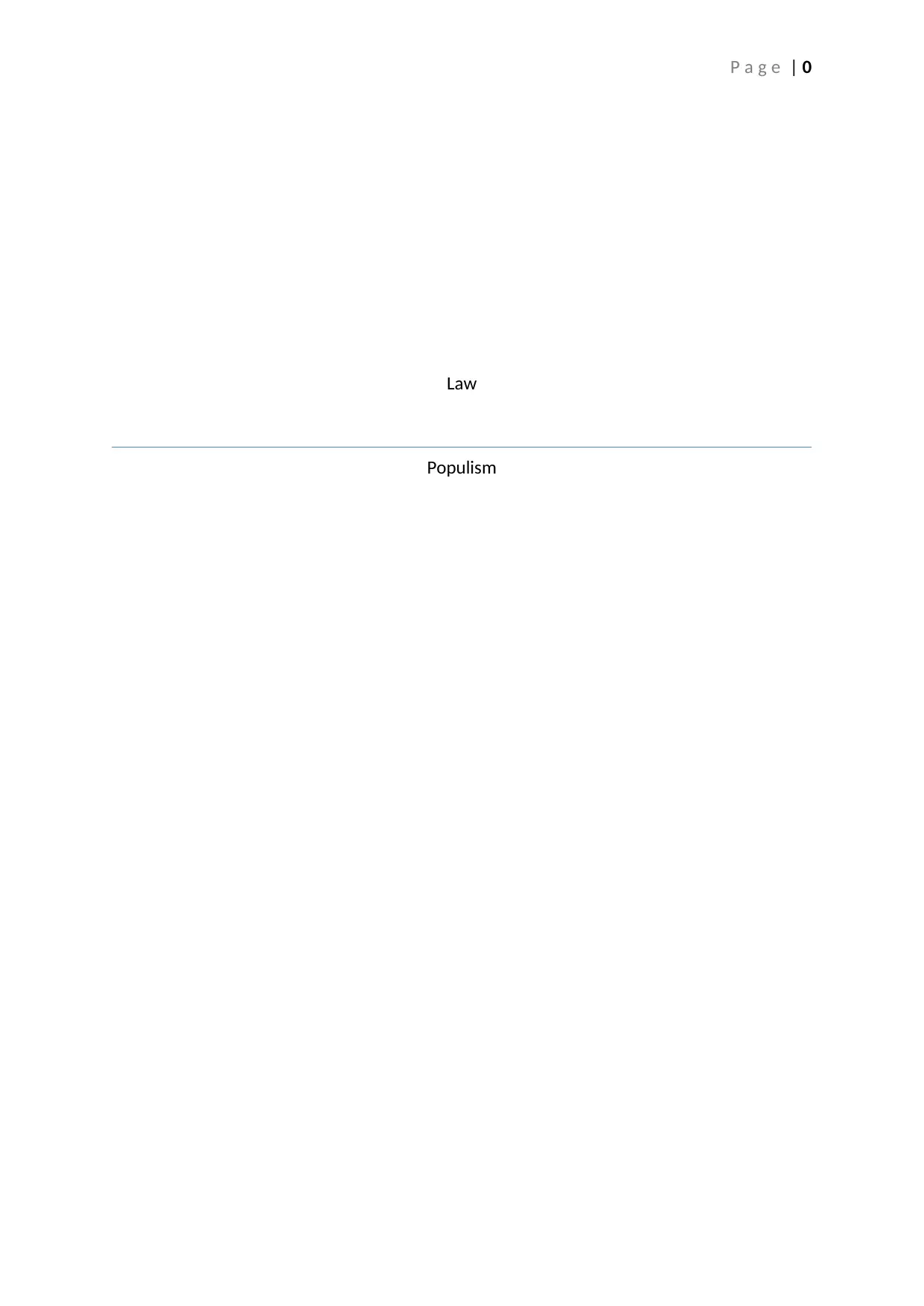
P a g e | 0
Law
Populism
Law
Populism
Paraphrase This Document
Need a fresh take? Get an instant paraphrase of this document with our AI Paraphraser
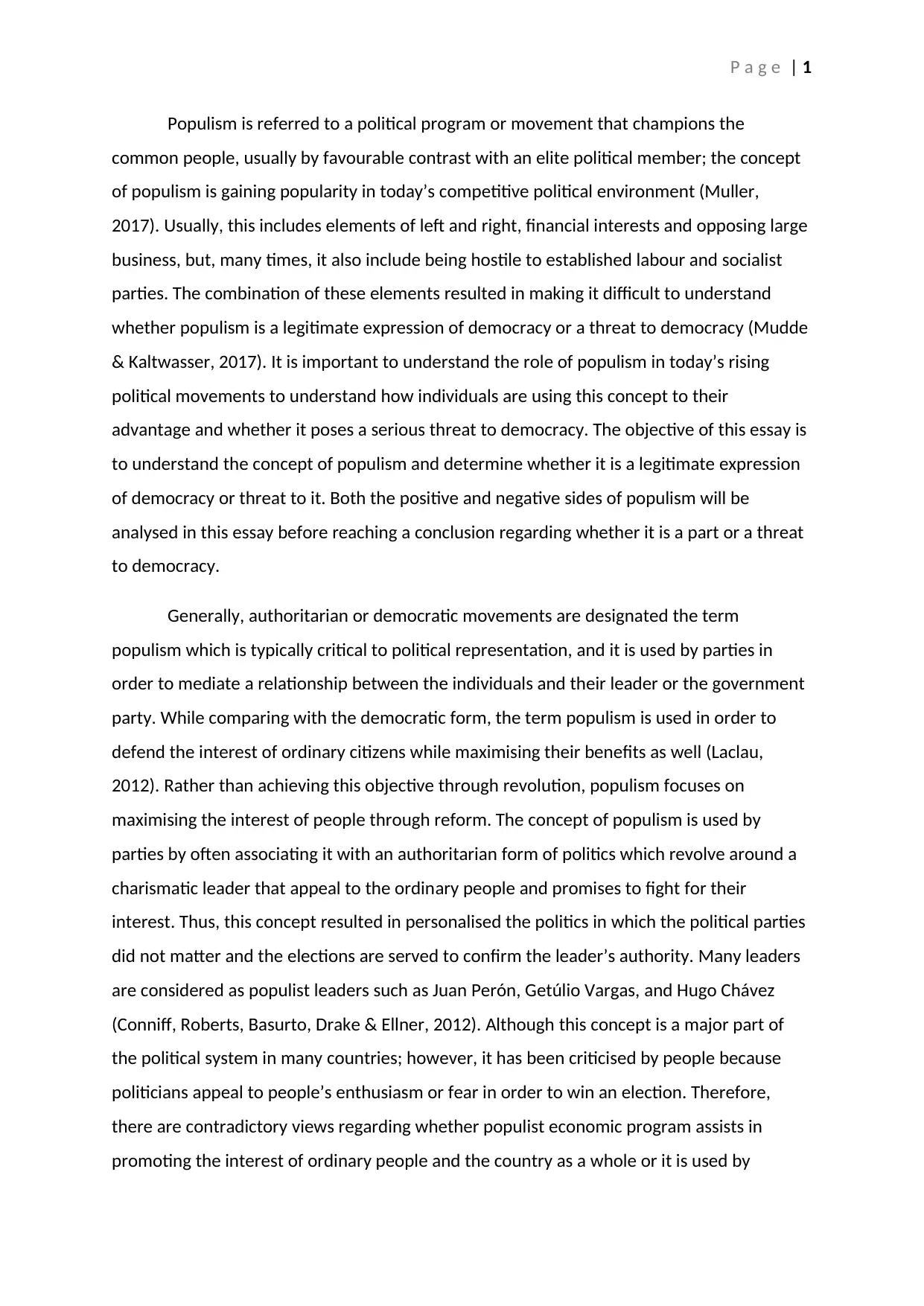
P a g e | 1
Populism is referred to a political program or movement that champions the
common people, usually by favourable contrast with an elite political member; the concept
of populism is gaining popularity in today’s competitive political environment (Muller,
2017). Usually, this includes elements of left and right, financial interests and opposing large
business, but, many times, it also include being hostile to established labour and socialist
parties. The combination of these elements resulted in making it difficult to understand
whether populism is a legitimate expression of democracy or a threat to democracy (Mudde
& Kaltwasser, 2017). It is important to understand the role of populism in today’s rising
political movements to understand how individuals are using this concept to their
advantage and whether it poses a serious threat to democracy. The objective of this essay is
to understand the concept of populism and determine whether it is a legitimate expression
of democracy or threat to it. Both the positive and negative sides of populism will be
analysed in this essay before reaching a conclusion regarding whether it is a part or a threat
to democracy.
Generally, authoritarian or democratic movements are designated the term
populism which is typically critical to political representation, and it is used by parties in
order to mediate a relationship between the individuals and their leader or the government
party. While comparing with the democratic form, the term populism is used in order to
defend the interest of ordinary citizens while maximising their benefits as well (Laclau,
2012). Rather than achieving this objective through revolution, populism focuses on
maximising the interest of people through reform. The concept of populism is used by
parties by often associating it with an authoritarian form of politics which revolve around a
charismatic leader that appeal to the ordinary people and promises to fight for their
interest. Thus, this concept resulted in personalised the politics in which the political parties
did not matter and the elections are served to confirm the leader’s authority. Many leaders
are considered as populist leaders such as Juan Perón, Getúlio Vargas, and Hugo Chávez
(Conniff, Roberts, Basurto, Drake & Ellner, 2012). Although this concept is a major part of
the political system in many countries; however, it has been criticised by people because
politicians appeal to people’s enthusiasm or fear in order to win an election. Therefore,
there are contradictory views regarding whether populist economic program assists in
promoting the interest of ordinary people and the country as a whole or it is used by
Populism is referred to a political program or movement that champions the
common people, usually by favourable contrast with an elite political member; the concept
of populism is gaining popularity in today’s competitive political environment (Muller,
2017). Usually, this includes elements of left and right, financial interests and opposing large
business, but, many times, it also include being hostile to established labour and socialist
parties. The combination of these elements resulted in making it difficult to understand
whether populism is a legitimate expression of democracy or a threat to democracy (Mudde
& Kaltwasser, 2017). It is important to understand the role of populism in today’s rising
political movements to understand how individuals are using this concept to their
advantage and whether it poses a serious threat to democracy. The objective of this essay is
to understand the concept of populism and determine whether it is a legitimate expression
of democracy or threat to it. Both the positive and negative sides of populism will be
analysed in this essay before reaching a conclusion regarding whether it is a part or a threat
to democracy.
Generally, authoritarian or democratic movements are designated the term
populism which is typically critical to political representation, and it is used by parties in
order to mediate a relationship between the individuals and their leader or the government
party. While comparing with the democratic form, the term populism is used in order to
defend the interest of ordinary citizens while maximising their benefits as well (Laclau,
2012). Rather than achieving this objective through revolution, populism focuses on
maximising the interest of people through reform. The concept of populism is used by
parties by often associating it with an authoritarian form of politics which revolve around a
charismatic leader that appeal to the ordinary people and promises to fight for their
interest. Thus, this concept resulted in personalised the politics in which the political parties
did not matter and the elections are served to confirm the leader’s authority. Many leaders
are considered as populist leaders such as Juan Perón, Getúlio Vargas, and Hugo Chávez
(Conniff, Roberts, Basurto, Drake & Ellner, 2012). Although this concept is a major part of
the political system in many countries; however, it has been criticised by people because
politicians appeal to people’s enthusiasm or fear in order to win an election. Therefore,
there are contradictory views regarding whether populist economic program assists in
promoting the interest of ordinary people and the country as a whole or it is used by
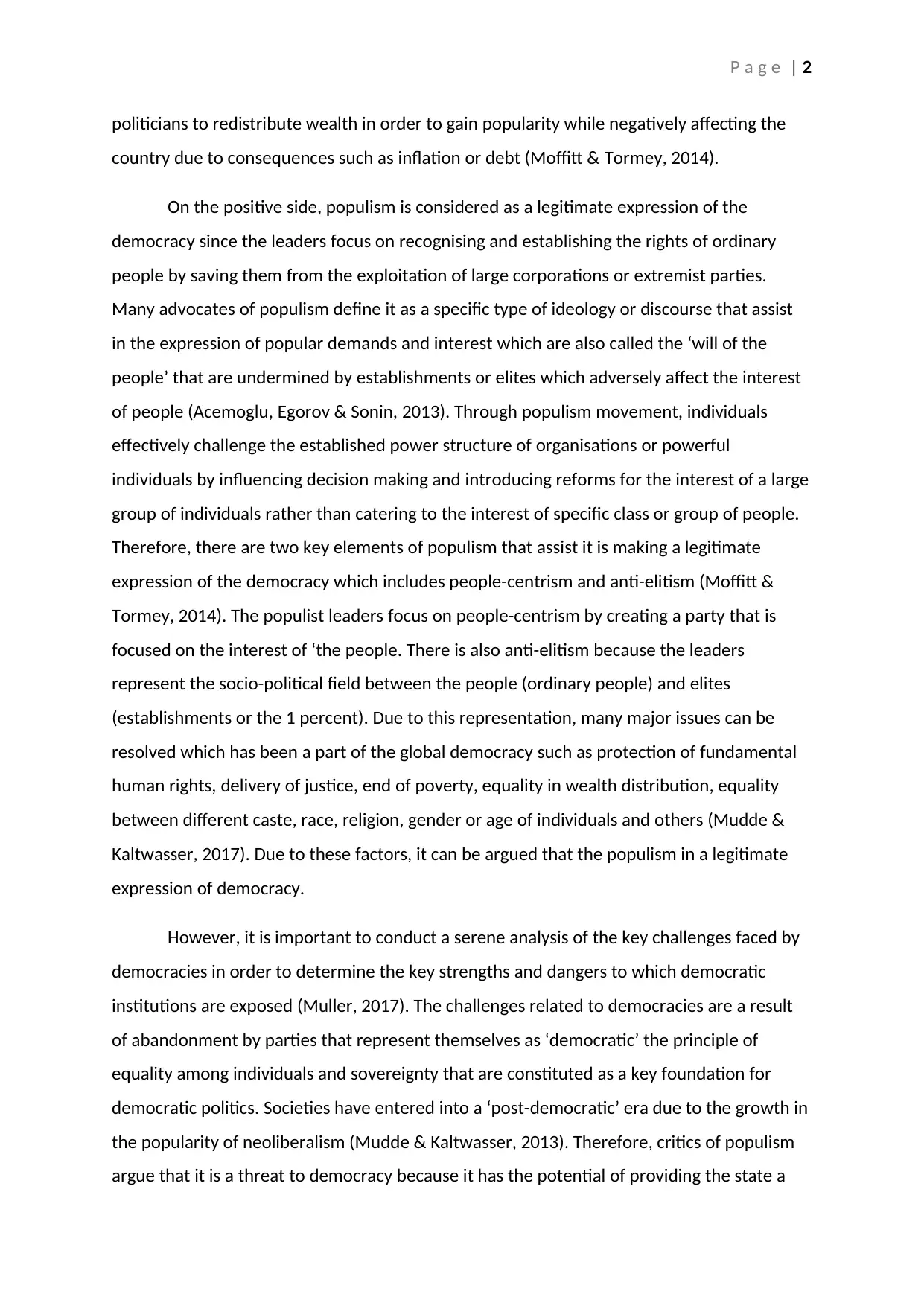
P a g e | 2
politicians to redistribute wealth in order to gain popularity while negatively affecting the
country due to consequences such as inflation or debt (Moffitt & Tormey, 2014).
On the positive side, populism is considered as a legitimate expression of the
democracy since the leaders focus on recognising and establishing the rights of ordinary
people by saving them from the exploitation of large corporations or extremist parties.
Many advocates of populism define it as a specific type of ideology or discourse that assist
in the expression of popular demands and interest which are also called the ‘will of the
people’ that are undermined by establishments or elites which adversely affect the interest
of people (Acemoglu, Egorov & Sonin, 2013). Through populism movement, individuals
effectively challenge the established power structure of organisations or powerful
individuals by influencing decision making and introducing reforms for the interest of a large
group of individuals rather than catering to the interest of specific class or group of people.
Therefore, there are two key elements of populism that assist it is making a legitimate
expression of the democracy which includes people-centrism and anti-elitism (Moffitt &
Tormey, 2014). The populist leaders focus on people-centrism by creating a party that is
focused on the interest of ‘the people. There is also anti-elitism because the leaders
represent the socio-political field between the people (ordinary people) and elites
(establishments or the 1 percent). Due to this representation, many major issues can be
resolved which has been a part of the global democracy such as protection of fundamental
human rights, delivery of justice, end of poverty, equality in wealth distribution, equality
between different caste, race, religion, gender or age of individuals and others (Mudde &
Kaltwasser, 2017). Due to these factors, it can be argued that the populism in a legitimate
expression of democracy.
However, it is important to conduct a serene analysis of the key challenges faced by
democracies in order to determine the key strengths and dangers to which democratic
institutions are exposed (Muller, 2017). The challenges related to democracies are a result
of abandonment by parties that represent themselves as ‘democratic’ the principle of
equality among individuals and sovereignty that are constituted as a key foundation for
democratic politics. Societies have entered into a ‘post-democratic’ era due to the growth in
the popularity of neoliberalism (Mudde & Kaltwasser, 2013). Therefore, critics of populism
argue that it is a threat to democracy because it has the potential of providing the state a
politicians to redistribute wealth in order to gain popularity while negatively affecting the
country due to consequences such as inflation or debt (Moffitt & Tormey, 2014).
On the positive side, populism is considered as a legitimate expression of the
democracy since the leaders focus on recognising and establishing the rights of ordinary
people by saving them from the exploitation of large corporations or extremist parties.
Many advocates of populism define it as a specific type of ideology or discourse that assist
in the expression of popular demands and interest which are also called the ‘will of the
people’ that are undermined by establishments or elites which adversely affect the interest
of people (Acemoglu, Egorov & Sonin, 2013). Through populism movement, individuals
effectively challenge the established power structure of organisations or powerful
individuals by influencing decision making and introducing reforms for the interest of a large
group of individuals rather than catering to the interest of specific class or group of people.
Therefore, there are two key elements of populism that assist it is making a legitimate
expression of the democracy which includes people-centrism and anti-elitism (Moffitt &
Tormey, 2014). The populist leaders focus on people-centrism by creating a party that is
focused on the interest of ‘the people. There is also anti-elitism because the leaders
represent the socio-political field between the people (ordinary people) and elites
(establishments or the 1 percent). Due to this representation, many major issues can be
resolved which has been a part of the global democracy such as protection of fundamental
human rights, delivery of justice, end of poverty, equality in wealth distribution, equality
between different caste, race, religion, gender or age of individuals and others (Mudde &
Kaltwasser, 2017). Due to these factors, it can be argued that the populism in a legitimate
expression of democracy.
However, it is important to conduct a serene analysis of the key challenges faced by
democracies in order to determine the key strengths and dangers to which democratic
institutions are exposed (Muller, 2017). The challenges related to democracies are a result
of abandonment by parties that represent themselves as ‘democratic’ the principle of
equality among individuals and sovereignty that are constituted as a key foundation for
democratic politics. Societies have entered into a ‘post-democratic’ era due to the growth in
the popularity of neoliberalism (Mudde & Kaltwasser, 2013). Therefore, critics of populism
argue that it is a threat to democracy because it has the potential of providing the state a
⊘ This is a preview!⊘
Do you want full access?
Subscribe today to unlock all pages.

Trusted by 1+ million students worldwide
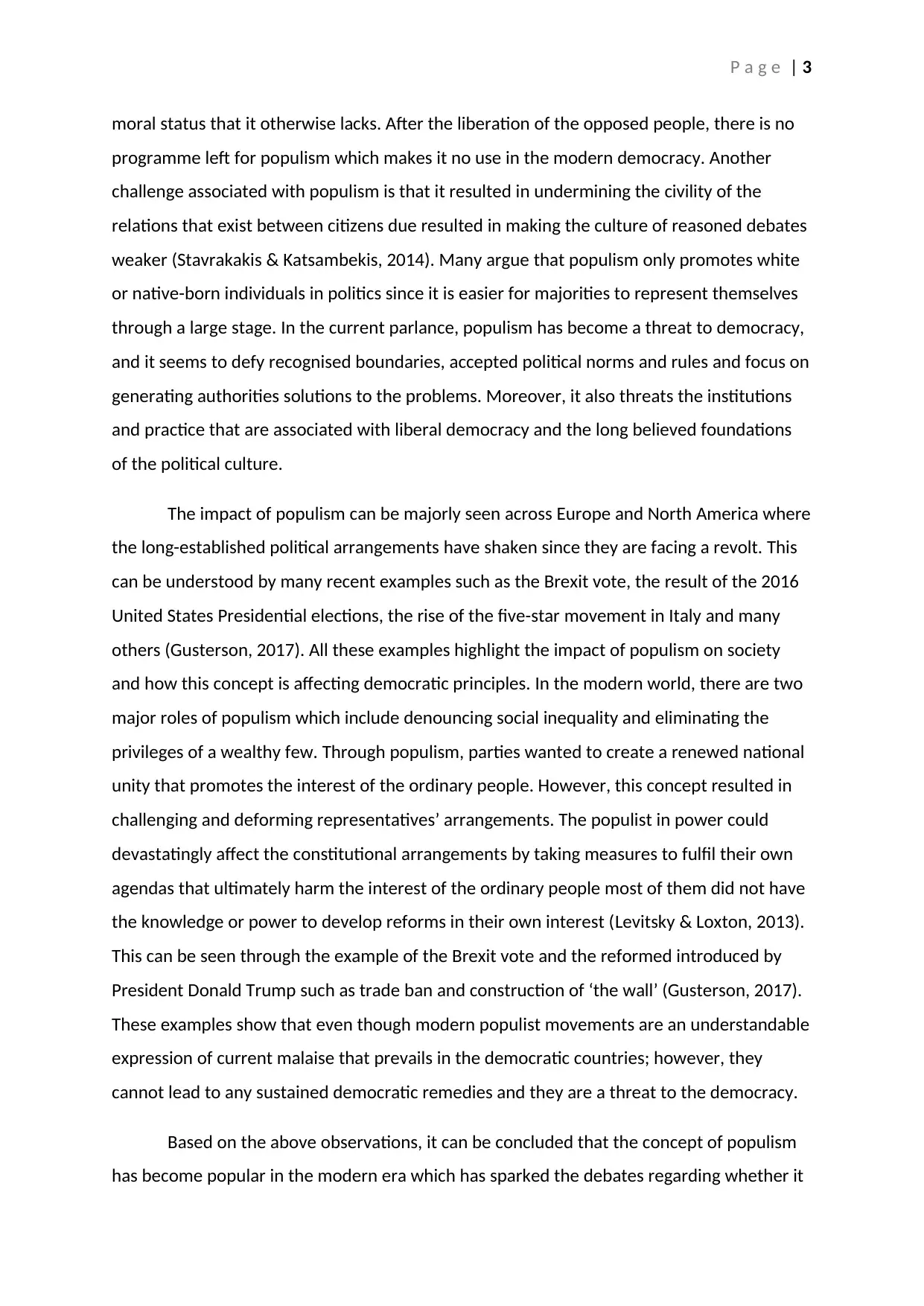
P a g e | 3
moral status that it otherwise lacks. After the liberation of the opposed people, there is no
programme left for populism which makes it no use in the modern democracy. Another
challenge associated with populism is that it resulted in undermining the civility of the
relations that exist between citizens due resulted in making the culture of reasoned debates
weaker (Stavrakakis & Katsambekis, 2014). Many argue that populism only promotes white
or native-born individuals in politics since it is easier for majorities to represent themselves
through a large stage. In the current parlance, populism has become a threat to democracy,
and it seems to defy recognised boundaries, accepted political norms and rules and focus on
generating authorities solutions to the problems. Moreover, it also threats the institutions
and practice that are associated with liberal democracy and the long believed foundations
of the political culture.
The impact of populism can be majorly seen across Europe and North America where
the long-established political arrangements have shaken since they are facing a revolt. This
can be understood by many recent examples such as the Brexit vote, the result of the 2016
United States Presidential elections, the rise of the five-star movement in Italy and many
others (Gusterson, 2017). All these examples highlight the impact of populism on society
and how this concept is affecting democratic principles. In the modern world, there are two
major roles of populism which include denouncing social inequality and eliminating the
privileges of a wealthy few. Through populism, parties wanted to create a renewed national
unity that promotes the interest of the ordinary people. However, this concept resulted in
challenging and deforming representatives’ arrangements. The populist in power could
devastatingly affect the constitutional arrangements by taking measures to fulfil their own
agendas that ultimately harm the interest of the ordinary people most of them did not have
the knowledge or power to develop reforms in their own interest (Levitsky & Loxton, 2013).
This can be seen through the example of the Brexit vote and the reformed introduced by
President Donald Trump such as trade ban and construction of ‘the wall’ (Gusterson, 2017).
These examples show that even though modern populist movements are an understandable
expression of current malaise that prevails in the democratic countries; however, they
cannot lead to any sustained democratic remedies and they are a threat to the democracy.
Based on the above observations, it can be concluded that the concept of populism
has become popular in the modern era which has sparked the debates regarding whether it
moral status that it otherwise lacks. After the liberation of the opposed people, there is no
programme left for populism which makes it no use in the modern democracy. Another
challenge associated with populism is that it resulted in undermining the civility of the
relations that exist between citizens due resulted in making the culture of reasoned debates
weaker (Stavrakakis & Katsambekis, 2014). Many argue that populism only promotes white
or native-born individuals in politics since it is easier for majorities to represent themselves
through a large stage. In the current parlance, populism has become a threat to democracy,
and it seems to defy recognised boundaries, accepted political norms and rules and focus on
generating authorities solutions to the problems. Moreover, it also threats the institutions
and practice that are associated with liberal democracy and the long believed foundations
of the political culture.
The impact of populism can be majorly seen across Europe and North America where
the long-established political arrangements have shaken since they are facing a revolt. This
can be understood by many recent examples such as the Brexit vote, the result of the 2016
United States Presidential elections, the rise of the five-star movement in Italy and many
others (Gusterson, 2017). All these examples highlight the impact of populism on society
and how this concept is affecting democratic principles. In the modern world, there are two
major roles of populism which include denouncing social inequality and eliminating the
privileges of a wealthy few. Through populism, parties wanted to create a renewed national
unity that promotes the interest of the ordinary people. However, this concept resulted in
challenging and deforming representatives’ arrangements. The populist in power could
devastatingly affect the constitutional arrangements by taking measures to fulfil their own
agendas that ultimately harm the interest of the ordinary people most of them did not have
the knowledge or power to develop reforms in their own interest (Levitsky & Loxton, 2013).
This can be seen through the example of the Brexit vote and the reformed introduced by
President Donald Trump such as trade ban and construction of ‘the wall’ (Gusterson, 2017).
These examples show that even though modern populist movements are an understandable
expression of current malaise that prevails in the democratic countries; however, they
cannot lead to any sustained democratic remedies and they are a threat to the democracy.
Based on the above observations, it can be concluded that the concept of populism
has become popular in the modern era which has sparked the debates regarding whether it
Paraphrase This Document
Need a fresh take? Get an instant paraphrase of this document with our AI Paraphraser
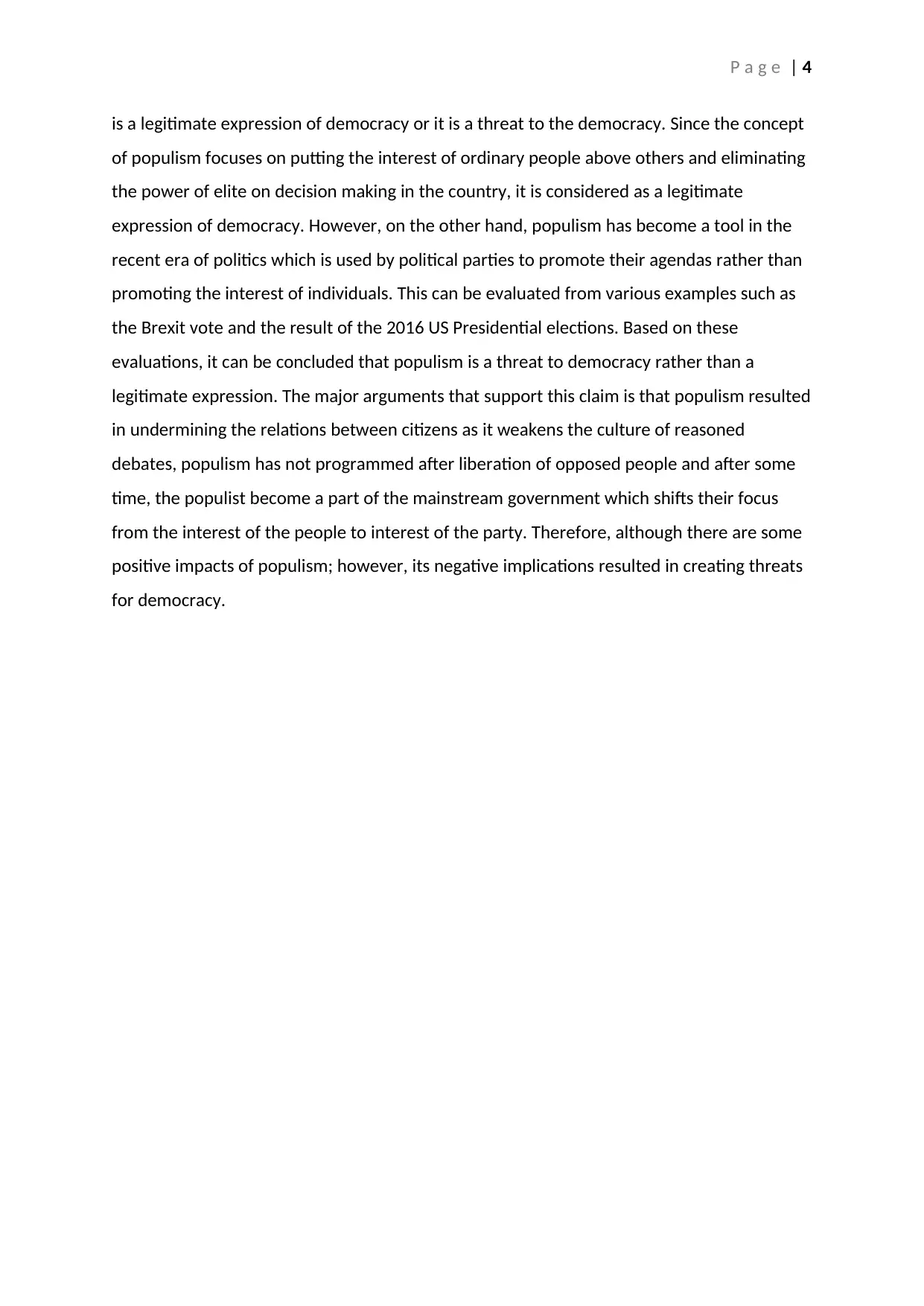
P a g e | 4
is a legitimate expression of democracy or it is a threat to the democracy. Since the concept
of populism focuses on putting the interest of ordinary people above others and eliminating
the power of elite on decision making in the country, it is considered as a legitimate
expression of democracy. However, on the other hand, populism has become a tool in the
recent era of politics which is used by political parties to promote their agendas rather than
promoting the interest of individuals. This can be evaluated from various examples such as
the Brexit vote and the result of the 2016 US Presidential elections. Based on these
evaluations, it can be concluded that populism is a threat to democracy rather than a
legitimate expression. The major arguments that support this claim is that populism resulted
in undermining the relations between citizens as it weakens the culture of reasoned
debates, populism has not programmed after liberation of opposed people and after some
time, the populist become a part of the mainstream government which shifts their focus
from the interest of the people to interest of the party. Therefore, although there are some
positive impacts of populism; however, its negative implications resulted in creating threats
for democracy.
is a legitimate expression of democracy or it is a threat to the democracy. Since the concept
of populism focuses on putting the interest of ordinary people above others and eliminating
the power of elite on decision making in the country, it is considered as a legitimate
expression of democracy. However, on the other hand, populism has become a tool in the
recent era of politics which is used by political parties to promote their agendas rather than
promoting the interest of individuals. This can be evaluated from various examples such as
the Brexit vote and the result of the 2016 US Presidential elections. Based on these
evaluations, it can be concluded that populism is a threat to democracy rather than a
legitimate expression. The major arguments that support this claim is that populism resulted
in undermining the relations between citizens as it weakens the culture of reasoned
debates, populism has not programmed after liberation of opposed people and after some
time, the populist become a part of the mainstream government which shifts their focus
from the interest of the people to interest of the party. Therefore, although there are some
positive impacts of populism; however, its negative implications resulted in creating threats
for democracy.
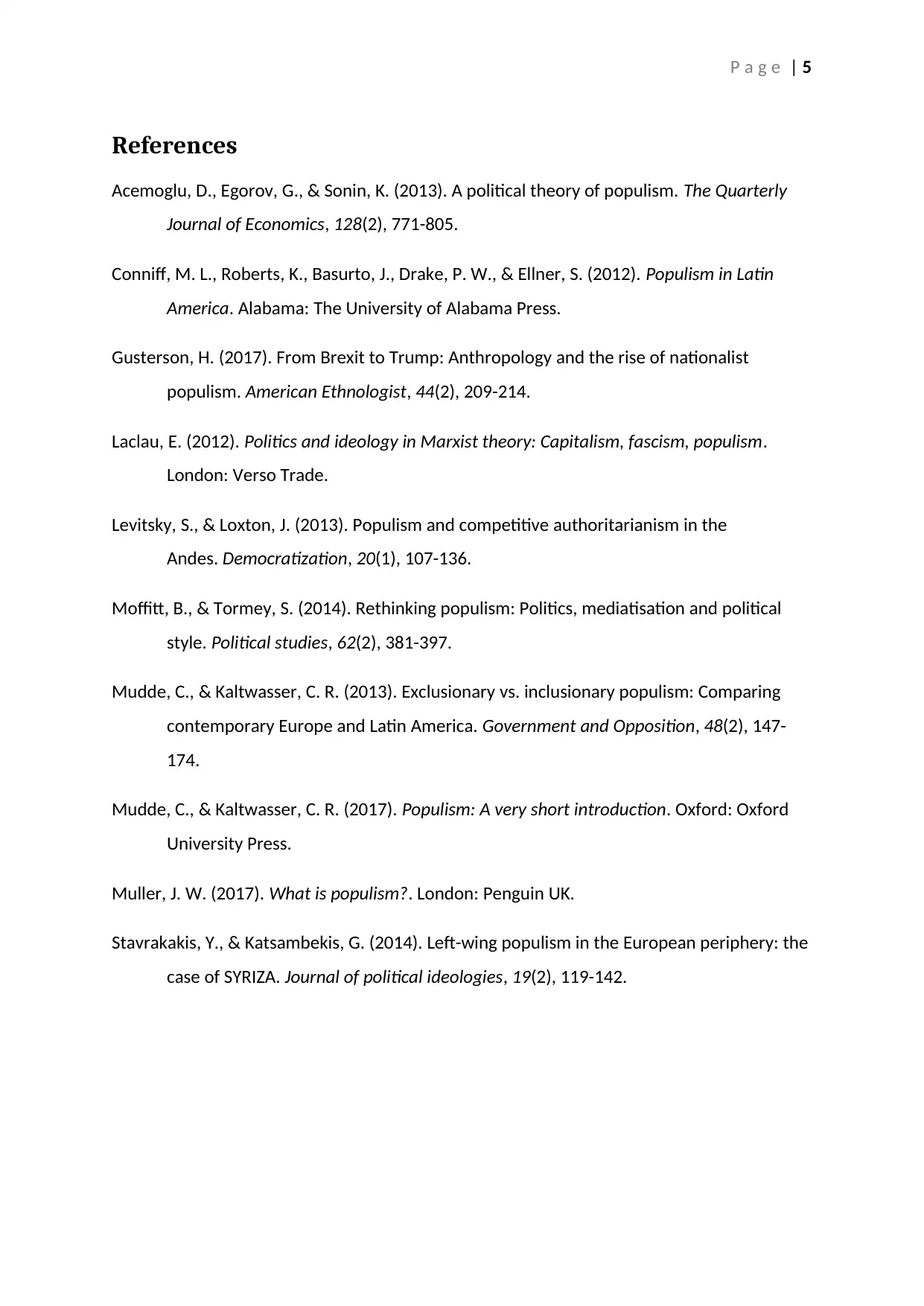
P a g e | 5
References
Acemoglu, D., Egorov, G., & Sonin, K. (2013). A political theory of populism. The Quarterly
Journal of Economics, 128(2), 771-805.
Conniff, M. L., Roberts, K., Basurto, J., Drake, P. W., & Ellner, S. (2012). Populism in Latin
America. Alabama: The University of Alabama Press.
Gusterson, H. (2017). From Brexit to Trump: Anthropology and the rise of nationalist
populism. American Ethnologist, 44(2), 209-214.
Laclau, E. (2012). Politics and ideology in Marxist theory: Capitalism, fascism, populism.
London: Verso Trade.
Levitsky, S., & Loxton, J. (2013). Populism and competitive authoritarianism in the
Andes. Democratization, 20(1), 107-136.
Moffitt, B., & Tormey, S. (2014). Rethinking populism: Politics, mediatisation and political
style. Political studies, 62(2), 381-397.
Mudde, C., & Kaltwasser, C. R. (2013). Exclusionary vs. inclusionary populism: Comparing
contemporary Europe and Latin America. Government and Opposition, 48(2), 147-
174.
Mudde, C., & Kaltwasser, C. R. (2017). Populism: A very short introduction. Oxford: Oxford
University Press.
Muller, J. W. (2017). What is populism?. London: Penguin UK.
Stavrakakis, Y., & Katsambekis, G. (2014). Left-wing populism in the European periphery: the
case of SYRIZA. Journal of political ideologies, 19(2), 119-142.
References
Acemoglu, D., Egorov, G., & Sonin, K. (2013). A political theory of populism. The Quarterly
Journal of Economics, 128(2), 771-805.
Conniff, M. L., Roberts, K., Basurto, J., Drake, P. W., & Ellner, S. (2012). Populism in Latin
America. Alabama: The University of Alabama Press.
Gusterson, H. (2017). From Brexit to Trump: Anthropology and the rise of nationalist
populism. American Ethnologist, 44(2), 209-214.
Laclau, E. (2012). Politics and ideology in Marxist theory: Capitalism, fascism, populism.
London: Verso Trade.
Levitsky, S., & Loxton, J. (2013). Populism and competitive authoritarianism in the
Andes. Democratization, 20(1), 107-136.
Moffitt, B., & Tormey, S. (2014). Rethinking populism: Politics, mediatisation and political
style. Political studies, 62(2), 381-397.
Mudde, C., & Kaltwasser, C. R. (2013). Exclusionary vs. inclusionary populism: Comparing
contemporary Europe and Latin America. Government and Opposition, 48(2), 147-
174.
Mudde, C., & Kaltwasser, C. R. (2017). Populism: A very short introduction. Oxford: Oxford
University Press.
Muller, J. W. (2017). What is populism?. London: Penguin UK.
Stavrakakis, Y., & Katsambekis, G. (2014). Left-wing populism in the European periphery: the
case of SYRIZA. Journal of political ideologies, 19(2), 119-142.
⊘ This is a preview!⊘
Do you want full access?
Subscribe today to unlock all pages.

Trusted by 1+ million students worldwide
1 out of 6
Your All-in-One AI-Powered Toolkit for Academic Success.
+13062052269
info@desklib.com
Available 24*7 on WhatsApp / Email
![[object Object]](/_next/static/media/star-bottom.7253800d.svg)
Unlock your academic potential
Copyright © 2020–2026 A2Z Services. All Rights Reserved. Developed and managed by ZUCOL.
